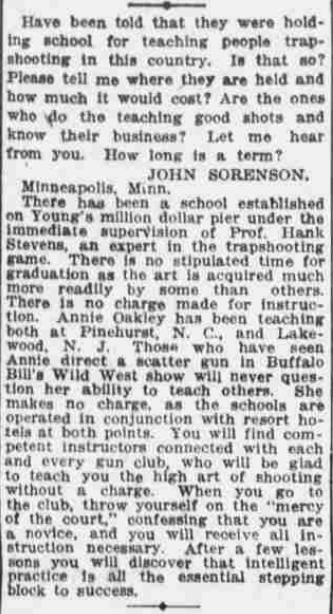
The News Scimitar, March 19, 1920
The Wild West Wonder From Western Ohio: How Annie Oakley Shot Down Barriers
"Don't you know it's the duty of a brother of man; to find where the need is and help where you can?" ~ Frank Butler, in 1904 poem
"I can guarantee a regiment of women for home protection."
~ Annie Oakley, 1917, to President Wilson
"Annie herself espoused some causes that were unpopular then but we would recognize as forward-thinking--chief among them, Native American rights. She also thought women should be trained for combat."
-Mary Zeiss Stange, personal interview, 2020
Annie Oakley's letter to President McKinley offered female sharpshooters for the Spanish American War. (Library of Congress)
"A company of lady sharpshooters... of no expense to the government" ~ Annie Oakley, 1898, to President McKinley
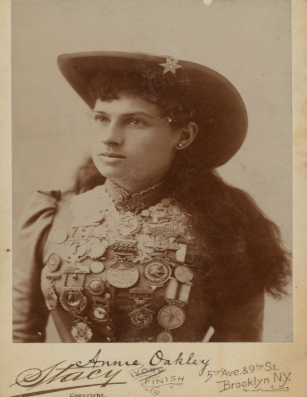
Annie Oakley poses with medals that years later were melted down for charity. (Stacy Studio)
"These medals she no longer has... she melted them down and donated them to a local tuberculosis hospital" ~ NC Observer
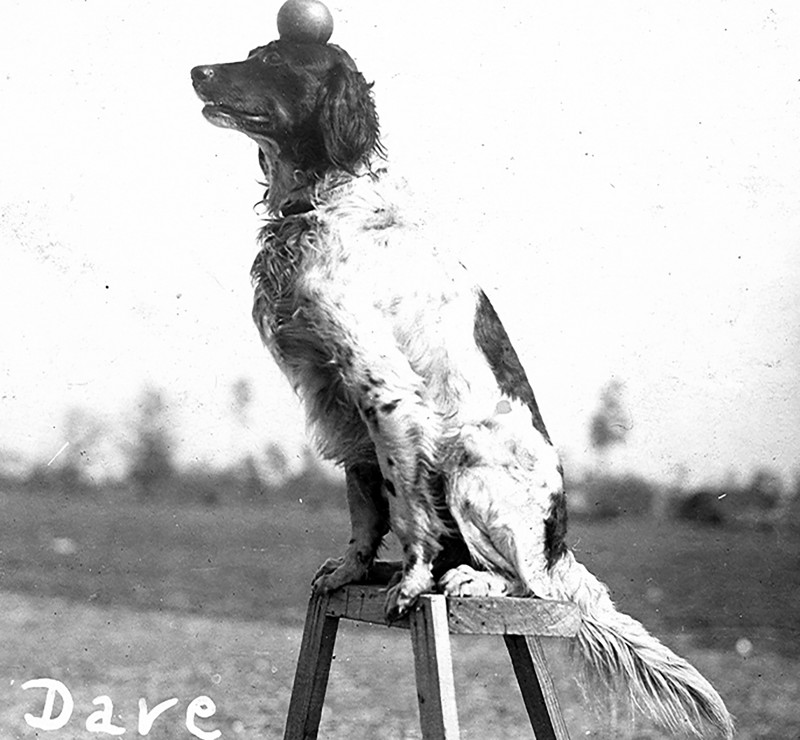
Annie would challenge her audience: if her dog was able to sniff out the audience's donations, the money would be donated to the Red Cross. (Dayton Daily News)
After retirement, Annie was involved in the National War Council, YMCA, War Camp Community Services, and the Red Cross.
“I believe every woman should learn how to shoot. It would give confidence and power of self-protection. And above all, it would teach them grace and poise. You cannot imagine how shooting demands perfect balance, and how shooting vanishes carelessness and slovenly ways.”
~ Annie Oakley
“Aim at a high mark and you'll hit it. No, not the first time nor the second time and maybe not the third. But keep on aiming and keep on shooting for only practice will make you perfect. Finally, you'll hit the bulls-eye of success.”
~ Annie Oakley
“God intended women to be outside as well as men, and they do not know what they are missing when they stay cooped up in the house.” -Annie Oakley, 1901

The News Scimitar, March 19, 1920
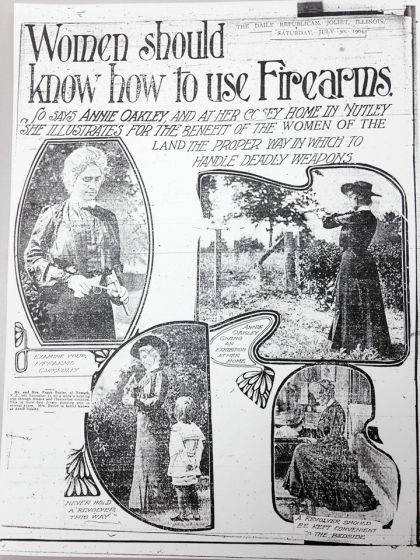
The Daily Republican, July 4, 1904

Dayton Daily News, March 26, 1922
"If only as a means of benefiting the health the use of firearms by woman is, therefore, well worth learning. Then again, shooting is not only a healthy recreation, but a pleasurable one, and one in which both body and mind are brought into activity." -Annie Oakley, 1894
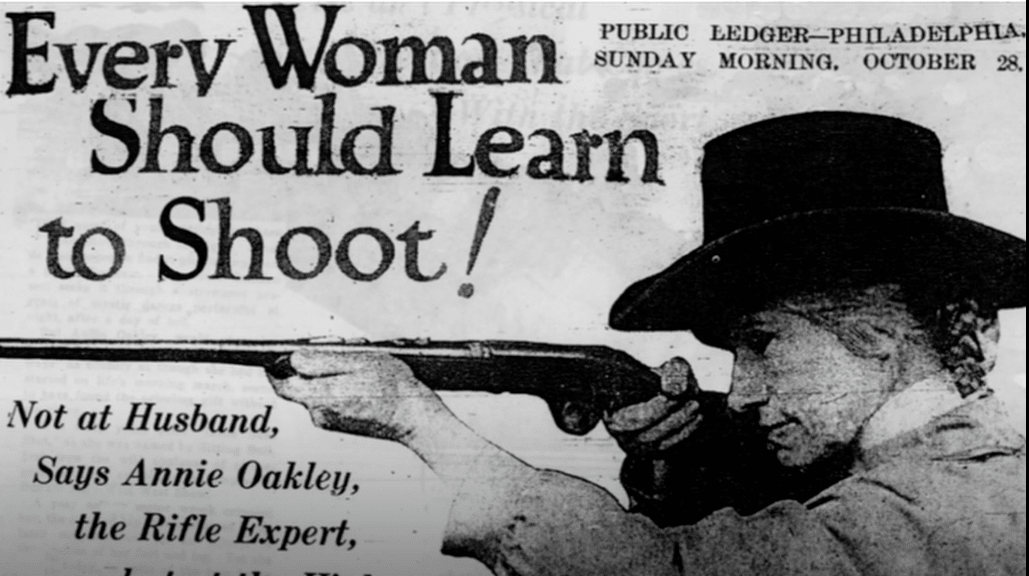
Annie Oakley offers shooting advice in newspaper, 1922. (PBS)
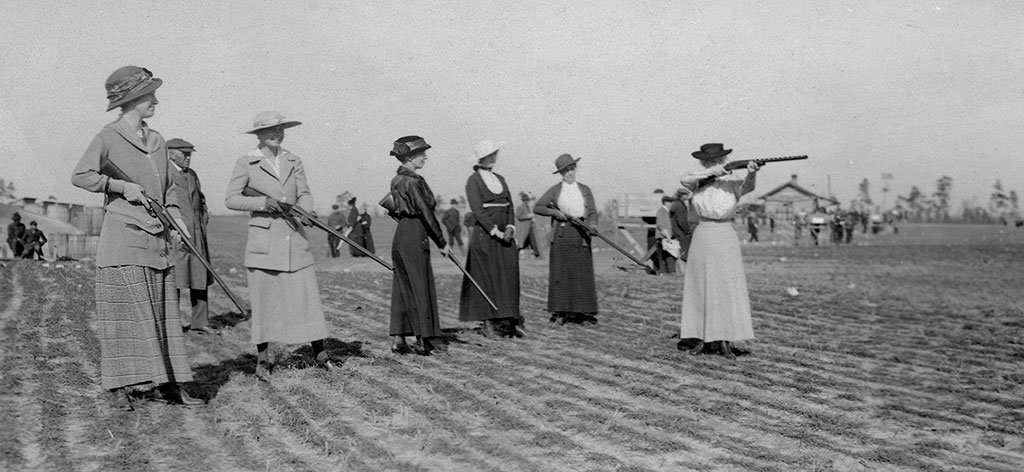
Annie Oakley teaches women in Pinehurst, 1920. (W.F. Cody Collection)
"Annie Oakley felt a handgun was the appropriate firearm for self-defense — it could be neatly tucked away in a muff or parasol. Given her own history of apparent sexual abuse, she had good reason to take self-defense seriously. Annie was, however, insistent that anyone who wants to use a gun for any reason (she was also a fan of long guns for hunting and recreational shooting)... should take lessons in appropriate gun use." ~ Mary Zeiss Stange, personal interview, 2020
Annie jealously guarded her well-kept reputation. On August 11, 1903, William Randolph Hearst's newspapers carried the headline "Stole To Get Cocaine — Annie Oakley, Once Famous Rifle Shot, Almost a Physical Wreck".
Burlesque performer Maude Fontenella, who went by the stage name "Any Oakley", had been arrested for stealing a man's trousers to support her cocaine habit. Fontenella posed as Little Sure Shot, and it appeared to the public that Annie was a fraud.
"Woman posing as Annie Oakley in Chicago is a fraud, contradict at once."
~ Annie Oakley to Philadelphia Press, 1903
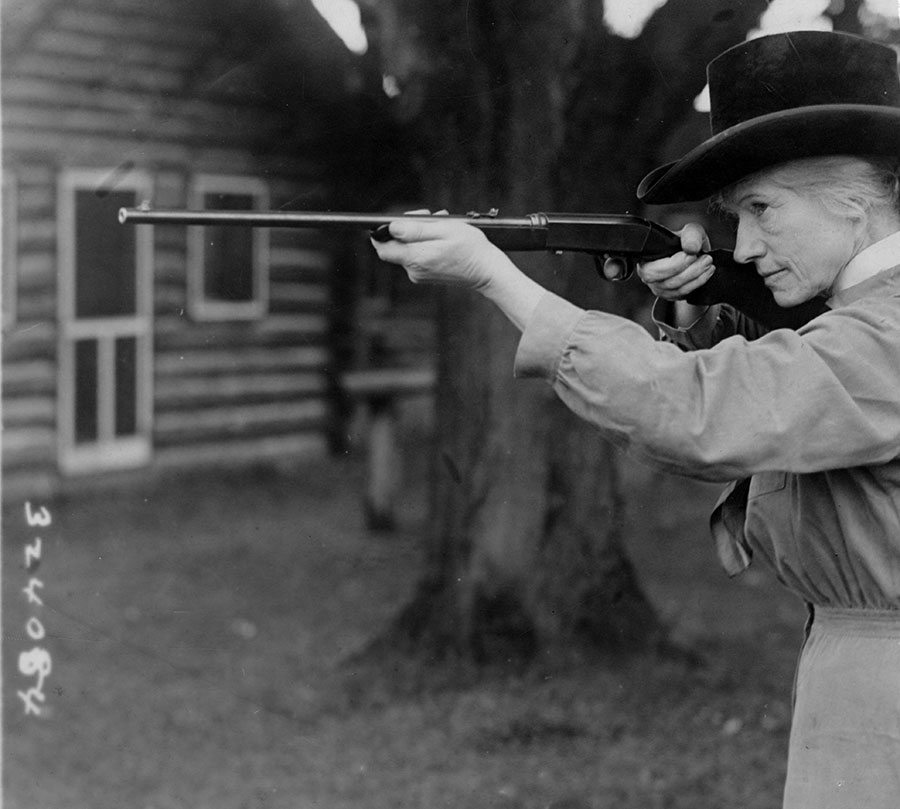
Annie Oakley was not afraid to take aim at those who slandered her reputation, 1904. (Buffalo Bill Center of the West)
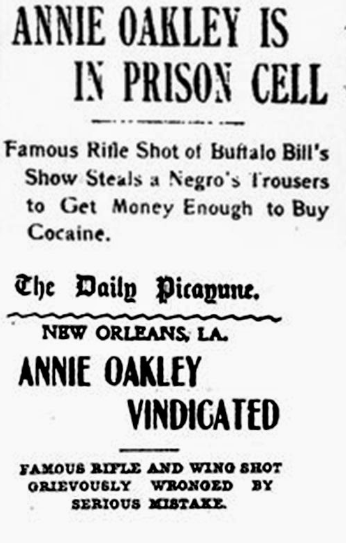
The scandal and vindication. (The Daily Picayune)
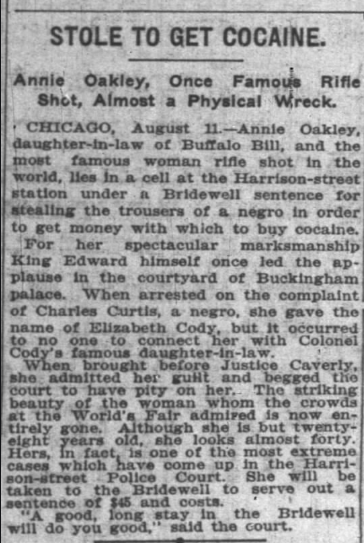
Details of the scandal. (The Indianapolis News)
Annie filed 55 libel suits against newspapers across the country. She spared no expense, hiring the best lawyers to defend her honor. Competitive in shooting and in the courtroom, she won 54 out of 55 lawsuits, and was awarded $800,000 in damages. Annie’s pursuit of justice may have put her in debt, but to her it was worth it to preserve her public reputation.
"Someone will pay for this dreadful mistake."
~ Annie Oakley to Hearst's Newspapers
America’s perception of Annie Oakley changed dramatically over the years. Was she the fearless and feminine Little Sure Shot with good morals, or the fraudulent woman who stole pants for cocaine? Annie's public perception further changed after her death in 1926. Movies and plays betrayed Annie’s honorable reputation by portraying her as a “hick” and sexualizing her image.
These values are the exact opposite of the true Annie Oakley.
Betty Hutton and Howard Keel singing "Anything You Can Do I Can Do Better" from "Annie Get Your Gun". (Broadway Collections)
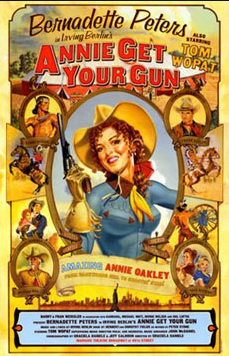
Playbill of the famous adaptation of Annie's life, "Annie Get Your Gun". A prime example of how Annie's image was portrayed, by looking at the image the viewer is left with the impression that Annie is a rowdy Western cowgirl. (BroadWay Musical Home)
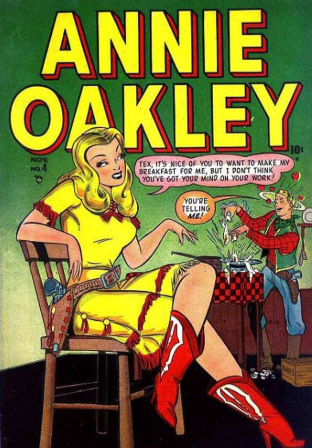
The comic "Annie Oakley" sexualizes her image and portrays Annie as not worthy of respect. The short skirt, red stilettos, and unnaturally blonde hair are historically inaccurate and do not represent the true Annie Oakley. (1948 Atlas Comic Books)
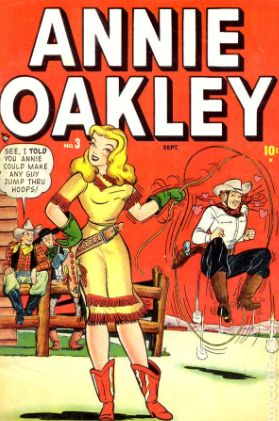
Another comic from the same series has repeated the same sequence of previous errors involving her attire. Along with that Annie is portrayed as a promiscuous female and the men around her viewing her as an object without respect. (1948 Atlas Comic Books)
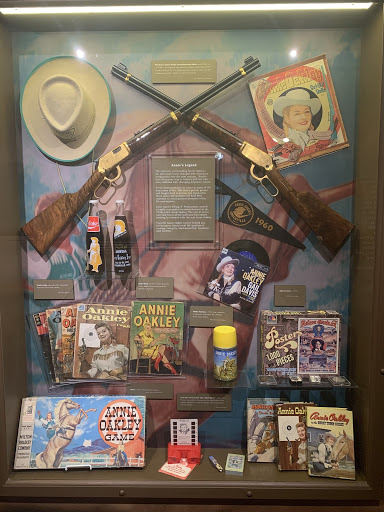
A display from the Garst Museum showcases a varity of primary sources from Annie's time including comic books, popular boardgames, puzzels, and even a Coca Cola advertisment. (Photo by Sofya Lukacheva)
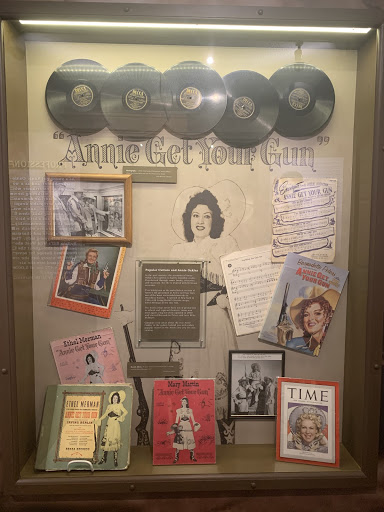
A display in the Garst Museum captures the people's perception of Annie though the years, sources ranging anywhere from a "Time's Magazine" dedicated to Annie to records from "Annie Get Your Gun". (Photo by Sofya Lukacheva)
On November 3, 1926 the legendary daughter, wife, sharpshooter, philanthropist, and Ohioan known to the world as Annie Oakley died in her home in Greenville, Ohio from pernicious anemia due to lead shot poisoning.

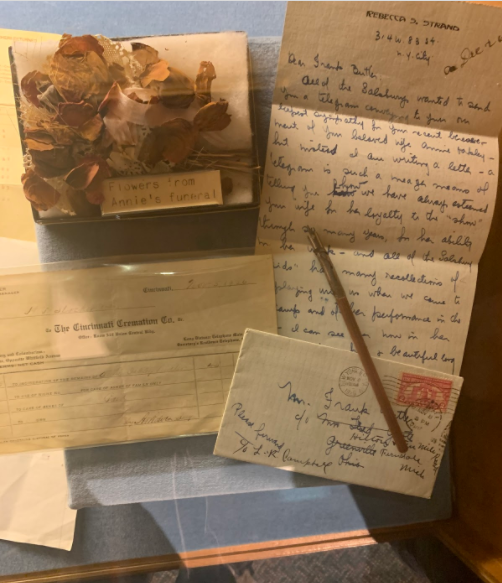
Annie Oakley's funeral flowers and condolence letters. (Photo by Sofya Lukacheva)
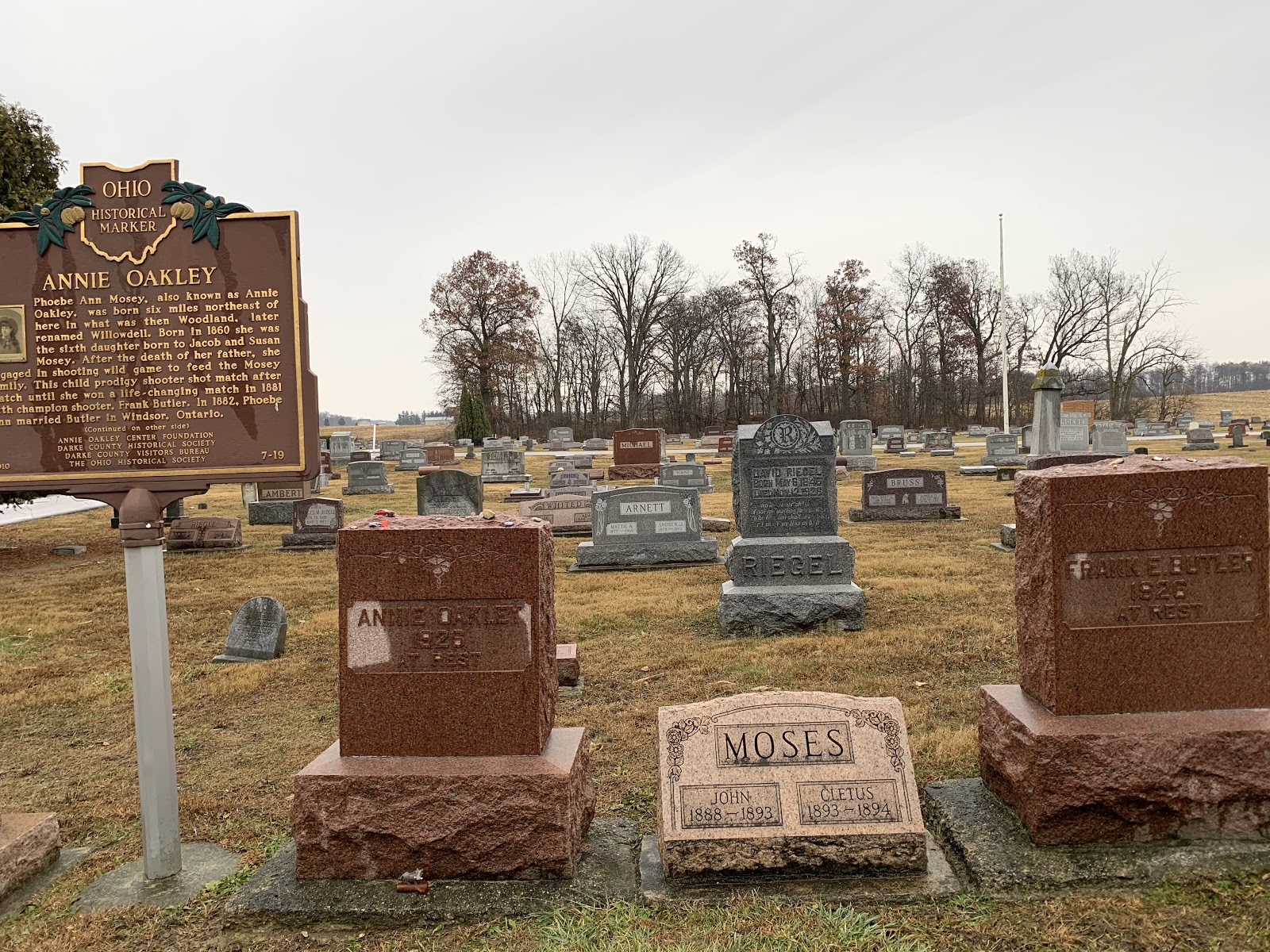
Overview of the graves of Annie, Frank, and John and Cletus Moses. (Photo by Sofya Lukacheva)
Annie Oakley was a woman of many names and wanted to protect each name. From her difficult childhood to her successful marriage and career, Annie Oakley took pride in her strong morals, character, and reputation. In each aspect of her life, Annie broke barriers that left a mark on both show business and society. Annie Oakley lived unconventionally: she was the legendary, talented Little Sure Shot in a male-dominated industry, while maintaining her demure, ladylike demeanor.

